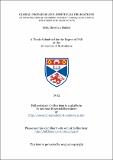Files in this item
Global problems and individual obligations : an investigation of different forms of consequentialism in situations with many agents
Item metadata
| dc.contributor.advisor | Mulgan, Tim | |
| dc.contributor.author | Pinkert, Felix Christian | |
| dc.coverage.spatial | 239 p. | en_US |
| dc.date.accessioned | 2014-02-25T12:07:49Z | |
| dc.date.available | 2014-02-25T12:07:49Z | |
| dc.date.issued | 2013 | |
| dc.identifier.uri | https://hdl.handle.net/10023/4458 | |
| dc.description.abstract | In this thesis, I investigate two challenges for Act Consequentialism which arise in situations where many agents together can make a difference in the world. Act Consequentialism holds that agents morally ought to perform those actions which have the best expected consequences. The first challenge for Act Consequentialism is that it often asks too much. This problem arises in situations where agents can individually make a difference for the better, e.g. by donating money to charities that fight extreme poverty. Act Consequentialism here often requires agents to make immense sacrifices which threaten to compromise agents future ability to do more good, reduce agents to a drastically simple lifestyle, and amount to taking up the slack left by others. The second challenge is that Act Consequentialism often asks too little. This problem arises both in situations where agents can not make any difference for the better, e.g. by stopping to pollute the environment, and in situations where they can not make any difference whatsoever, e.g. when they individually vote or protest against a morally bad but widely supported policy. Act Consequentialism is subject to the above challenges because it only considers the differences that individuals can make on their own. A natural response is to adopt a form of Collective Consequentialism which considers the difference that agents can make together. I investigate how far Act Consequentialism can deal with each of the above challenges, and how far these challenges require us to adopt Collective Consequentialism. | en_US |
| dc.language.iso | en | en_US |
| dc.publisher | University of St Andrews | |
| dc.subject | Ethics | en_US |
| dc.subject | Consequentialism | en_US |
| dc.subject | Game theory | en_US |
| dc.subject | Global problems | en_US |
| dc.subject.lcc | BJ1500.C63P5 | |
| dc.subject.lcsh | Consequentialism (Ethics) | en_US |
| dc.subject.lcsh | Game theory | en_US |
| dc.title | Global problems and individual obligations : an investigation of different forms of consequentialism in situations with many agents | en_US |
| dc.type | Thesis | en_US |
| dc.type.qualificationlevel | Doctoral | en_US |
| dc.type.qualificationname | PhD Doctor of Philosophy | en_US |
| dc.publisher.institution | The University of St Andrews | en_US |
This item appears in the following Collection(s)
Items in the St Andrews Research Repository are protected by copyright, with all rights reserved, unless otherwise indicated.

